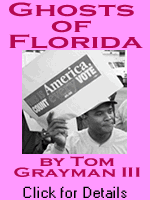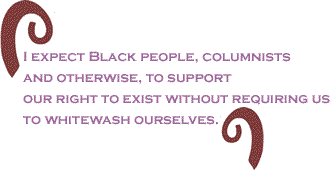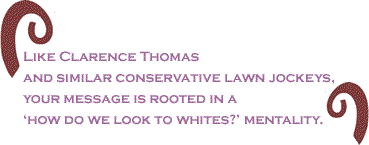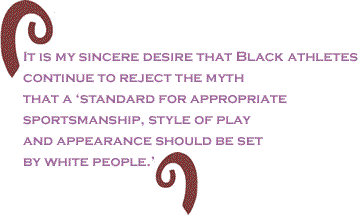
|
|||||||||||||||||||||
 |
|||||||||||||||||||||
 |
|||||||||||||||||||||
|
In the wake of the basketball brawl in Detroit and the harsh penalties meted out to three players, Kansas City Star sports columnist Jason Whitlock issued a shockingly broad denunciation of Black athletes’ “style of play and sportsmanship.” Whitlock’s November 22 column further attempts to present a critique of African American behavior and politics, in general:
Guest Commentator John Reynolds III, responds.
Jason Whitlock, who died and made you resident
HNIC? Better
yet, what white benefactor’s message do you promote To use your language, “let’s cut through all the garbage and
get to the real issue.” Okay. House Negroes such as yourself
do not have a mind of your own. Like Clarence Thomas and similar
conservative lawn jockeys, your message is rooted in a “how do
we look to whites?” mentality. You are so happy to sit at the
white boys’ table of oppression, you believe you have
American racism’s vitriol and endurance do not surprise me. American racism’s denial insults me. American racism’s House Negroes dismay me, but shouldn’t. The fuel of my dismay is the expectation that we will not delude ourselves regarding past, present and persistent American racism. White America, which you euphemistically refer to as “the customer,” has a dismal track record of addressing the interests of Black people as human beings. Perhaps you have read of The Missouri Compromise, 40 acres and a Mule (never received), Plessey v. Ferguson, and de facto segregation fifty years after Brown v. Board of Education? Are you suggesting slavery endured because cotton buyers (customers) approved of it with their patronage? Are you suggesting a cotton boycott fueled the end of slavery? You have made several troubling assertions
in your column with which I would disagree even if you had
facts to support them. “Stern’s players
must bow to the desires of their fan base”? We, Black people, “begged for
integration”? “We demanded the right to play in the major
leagues”? Stern’s |
| December 2 2004 Issue 116 |
|||||||||
|
|||||||||
|
|
|||||||||
| Printer Friendly Version | |||||||||
 |
|||||||||
 |
|||||||||
 |
|||||||||
| |
|||||||||
| |
|||||||||



























